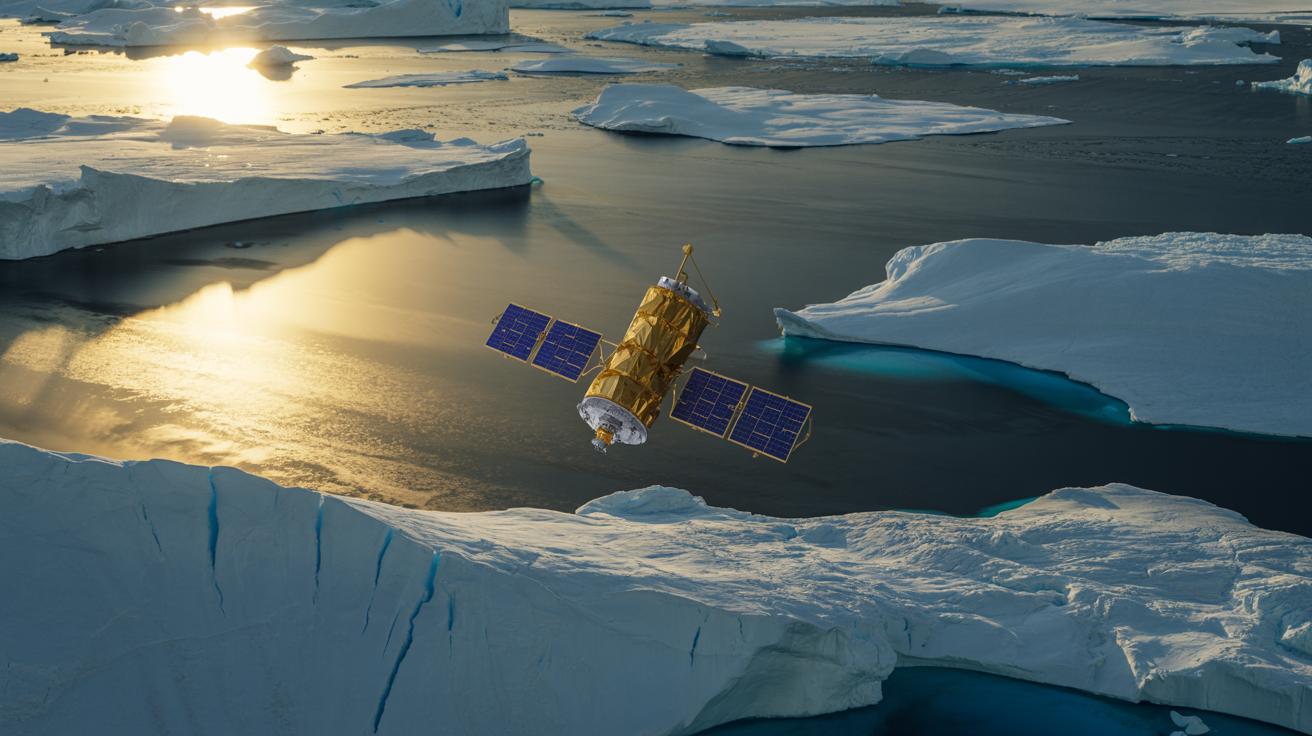What You Need to Know
- 🌡️ The US Department of Defense has halted processing and sharing of crucial sea ice satellite data, raising concerns among climate scientists.
- 📉 Scientists warn that the loss of this data could hinder the ability to accurately track and predict climate change impacts on global sea ice levels.
- 🌍 The decision comes as record low sea ice levels threaten to accelerate global warming and contribute to rising sea levels worldwide.
- 🔍 The scientific community is seeking alternative methods to maintain a consistent long-term climate record, despite challenges in data consistency and accuracy.
- 🤝 The situation underscores the urgent need for international collaboration and investment in climate monitoring technologies to mitigate the effects of this data loss.
The recent decision by the US Department of Defense to halt the processing and delivery of critical satellite data marks a pivotal moment in the battle against global warming. This data, essential for monitoring the rapid changes in sea ice levels at both poles, has been a backbone for climate research worldwide. The loss of such information raises significant concerns among scientists and environmentalists about the future of climate monitoring and the potential acceleration of climate impacts. As we delve into the implications of this decision, the urgency to find alternative solutions becomes ever more pressing. What does this mean for the future of our planet’s climate?
The Critical Role of Sea Ice Data
Sea ice data has long served as an early warning system for climate change, providing invaluable insights into how global warming is impacting our planet. This data helps researchers understand the dynamics of sea ice, which plays a crucial role in reflecting the sun’s energy back into space. As sea ice levels decline, more ocean water is exposed, absorbing more heat and exacerbating global warming. The loss of this data could significantly hinder scientists’ ability to track these changes accurately and predict future climate scenarios.
The National Snow and Ice Data Center (NSIDC) has maintained a comprehensive Sea Ice Index, relied upon by researchers worldwide, to monitor the extent of sea ice in near real-time. This index is crucial for understanding not just the current state but also the trends and potential future scenarios of climate change. Without this data, there is a risk of losing the context needed to fully understand the long-term impacts of sea ice loss on global climate patterns.
Implications of the US Decision
The announcement from the US Department of Defense to cease processing and providing sea ice data comes at a time when climate change impacts are more pronounced than ever. Scientists like Dr. Alex Fraser have expressed concerns that the discontinuation of this data could not have occurred at a worse time. The decision impacts climate models and predictions, as the data was vital for maintaining a consistent record of sea ice changes. Without it, researchers fear a gap in the continuity and accuracy of long-term climate data.
Furthermore, the decision has raised alarms about the future of climate science under the current US administration, which has previously targeted climate-related functions across various government agencies. This move could set a precedent, potentially leading to further reductions in climate data collection and sharing, which is essential for informed policy-making and international climate agreements.
Consequences for Global Climate Understanding
The implications of losing this data extend beyond the borders of the United States. Global climate research relies heavily on cooperative data sharing to form a complete picture of the earth’s changing climate. The absence of US data could create significant gaps in understanding the full extent of sea ice loss and its global repercussions. As sea ice levels reach record lows, the potential for accelerated sea level rise increases, driven by processes such as iceberg calving from Antarctic ice shelves.
These changes are not just theoretical. Recent studies have already linked the loss of sea ice to increased iceberg calving and the potential for rising sea levels, which could have devastating impacts on coastal communities worldwide. In this interconnected global climate system, the loss of comprehensive sea ice data could hinder efforts to mitigate these effects and protect vulnerable populations.
Finding Alternative Solutions
In response to the discontinuation of US data, the scientific community is exploring alternative solutions to continue monitoring sea ice levels. The NSIDC is working with higher-resolution instruments from other satellites, but there are challenges in ensuring data consistency and accuracy. The differences in data collection methods may pose hurdles in maintaining a reliable long-term climate record.
Despite these challenges, scientists remain optimistic that a robust and quality record can still be achieved, though there may be uncertainties in trend estimates. This situation highlights the need for increased international collaboration and investment in climate monitoring technologies to fill the gaps left by the absence of US data. The urgency is clear: the world must adapt quickly to ensure that critical climate research continues uninterrupted.
As the world grapples with the consequences of climate change, the importance of comprehensive and reliable data cannot be overstated. The US decision to halt sea ice data sharing underscores the challenges and uncertainties facing climate scientists today. With the stakes higher than ever, the global community must come together to find innovative solutions for monitoring and mitigating climate impacts. How will the scientific community adapt to these challenges, and what new strategies will emerge to ensure the continuity of crucial climate data?
Did you like it?4.6/5 (24)







9 comments
Evelyn_Oracle
Wow, that’s really concerning. How soon could we see the effects of this data gap?
jackson6
Can international collaborations help overcome this data loss? Time for some global teamwork! 🌍
Kylie
Does this mean we could see more extreme weather events soon? I’m worried about rising sea levels.
JasperDreamwalker8
Hoping for some superhero scientists to come up with a fix for this! 🚀
Hunter3
This seems like a huge setback. How can we persuade policymakers to prioritize climate data sharing?
layla
Oh great, just what we needed – more reasons to panic about climate change. 😅
ezekiel_celestial
Is there any way for independent researchers to fill the gap left by this decision? 🤔
haley
Thank you for highlighting this issue. It’s crucial that the global community steps up and finds alternative data sources!
Riley
Why would the US stop sharing such important data? Are there any plans to resume it in the future?